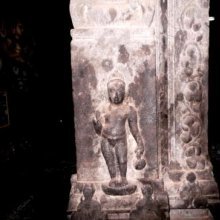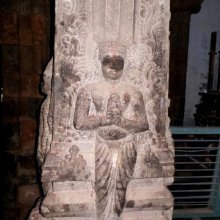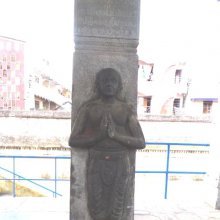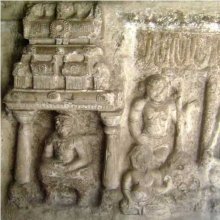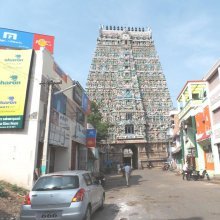Alvar, Aḻvar, Ārvār, Āḻvār, Āḷvār, Alwar, Ālvār: 7 definitions
Introduction:
Alvar means something in Hinduism, Sanskrit, the history of ancient India, Tamil. If you want to know the exact meaning, history, etymology or English translation of this term then check out the descriptions on this page. Add your comment or reference to a book if you want to contribute to this summary article.
The Sanskrit term Āḷvār can be transliterated into English as Alvar or Alivar, using the IAST transliteration scheme (?).
Images (photo gallery)
(+4 more images available)
In Hinduism
Purana and Itihasa (epic history)
Source: archive.org: Puranic EncyclopediaĀlvār (आल्वार्).—See the word NAMMALVĀR.

The Purana (पुराण, purāṇas) refers to Sanskrit literature preserving ancient India’s vast cultural history, including historical legends, religious ceremonies, various arts and sciences. The eighteen mahapuranas total over 400,000 shlokas (metrical couplets) and date to at least several centuries BCE.
Vaishnavism (Vaishava dharma)
Source: Acta Orientalia vol. 74 (2013): Historical sequence of the Vaiṣṇava DivyadeśasĀḻvār (आḻवार्) refers to “one immersed or lost in his love for the Lord Viṣṇu”.—The twelve Āḻvārs are brought under three groups. The Āḻvār is a divinity, one immersed or lost in his love for the Lord Viṣṇu (āḻ “immerse”, āḻvār “one immersed [in Viṣṇu-bhakti]”). The Āḻvārs are believed to have visited the venues where the temple of the Lord was, composed hymns in praise of those sacred centers, the Mūrti, the tīrtha, the flora and fauna, the pūjās and festivals, and spread the cult. Though scholars find the rudiments of bhakti in the Paripāṭal, it is in the hymns of the Āḻvārs that we really find the blossoming of the bhāgavata/bhakti tradition that germinated in the north during the early centuries of the Christian era.
Note: The Āḻvārs are considered to be the aṃśas (manifestation) of Vaiṣṇava marks of identification; e.g.
- Poykai – pañcajanya (a demon turned śaṅkha),
- Pūtam – gadā “mace”,
- Pēy – nandaka (khaḍga of Viṣṇu),
- Maḻicai – cakra,
- Maturakavi – Vainateya (Garuḍa, son of Vinatā),
- Nam - Śeṣa,
- Kulacēkarar – kaustubha (celebrated necklace of Viṣṇu),
- Periyāḻvār - Garuḍa,
- Āṇṭāḷ - Bhūdevī,
- Toṇṭaraṭippoṭi – vanamālā (garland of holy basil),
- Pāṇ - śrīvatsa,
- Maṅkai - śāṛṅga (bow of Viṣṇu).

Vaishnava (वैष्णव, vaiṣṇava) or vaishnavism (vaiṣṇavism) represents a tradition of Hinduism worshipping Vishnu as the supreme Lord. Similar to the Shaktism and Shaivism traditions, Vaishnavism also developed as an individual movement, famous for its exposition of the dashavatara (‘ten avatars of Vishnu’).
General definition (in Hinduism)
Source: Academic Room: HinduismĀḻvār refers to a group of twelve Vaishnava poet-saints from Tamil-speaking South India who lived between the 6th and 9th centuries. The term Alvar (singular) is derived from the Tamil root āḻ, “to dive,” and in the noun form means “those who dive deep.” Thus Alvar, which is both a title and a designation, emphasizes the experiential and emotive dimension of the poets’ roles in the formation of Tamil Vaishnavism. Nāthamuni (c. 10th century), the first preceptor of the sect of Srivaishnavism, is credited with compiling the poems of the Alvars into a collection known as theNālāyira Divya Prabandham (The divine collection of four thousand).
Source: Oxford Bibliographies: HinduismĀḻvār refers to a group of twelve Vaishnava poet-saints from Tamil-speaking South India who lived between the 6th and 9th centuries. The term Alvar (singular) is derived from the Tamil root āḻ, “to dive,” and in the noun form means “those who dive deep.” Thus Alvar, which is both a title and a designation, emphasizes the experiential and emotive dimension of the poets’ roles in the formation of Tamil Vaishnavism. Nāthamuni (c. 10th century), the first preceptor of the sect of Srivaishnavism, is credited with compiling the poems of the Alvars into a collection known as the Nālāyira Divya Prabandham (The divine collection of four thousand). This article focuses on primary sources of the Alvars that are available in translation and select primary sources about the Alvars (such as hagiographies) that are important in understanding their significance to the formation of Tamil Vaishnavism. The hagiographies are, however, not available in English translation. In addition, this article covers the commentarial traditions associated with the Alvars in general and some Alvars in particular.
India history and geography
Source: archive.org: Personal and geographical names in the Gupta inscriptionsAlwar is another name for Śalvapura: a place name ending in pura mentioned in the Gupta inscriptions. Śalvapura is transformed into Alwar in the way that pura is changed to war.

The history of India traces the identification of countries, villages, towns and other regions of India, as well as mythology, zoology, royal dynasties, rulers, tribes, local festivities and traditions and regional languages. Ancient India enjoyed religious freedom and encourages the path of Dharma, a concept common to Buddhism, Hinduism, and Jainism.
Languages of India and abroad
Kannada-English dictionary
Source: Alar: Kannada-English corpusĀḷvār (ಆಳ್ವಾರ್):—
1) [noun] one who is deep in meditation on the attributes of the Supreme Being.
2) [noun] any of the ten Tamil Vaiṣṇava canonised saints whose hymns in praise of Viṣṇu are regarded as sacred scriptures.
--- OR ---
Āḻvar (ಆೞ್ವರ್):—[noun] = ಆೞ್ವಾರ್ [alvar].
--- OR ---
Āḻvār (ಆೞ್ವಾರ್):—
1) [noun] one who is deep in meditation on the attributes of the Supreme Being.
2) [noun] any of the ten Tamil Vaiṣṇava canonised saints whose hymns in praise of Viṣṇu are regarded as sacred scriptures.
Kannada is a Dravidian language (as opposed to the Indo-European language family) mainly spoken in the southwestern region of India.
Tamil dictionary
Source: DDSA: University of Madras: Tamil LexiconĀḻvār (ஆழ்வார்) noun < ஆழ்¹-. [azh¹-.] [Telugu: āḷvāru, Kanarese, Malayalam: āḻvār.]
1. One who is deep in meditation on the attributes of the Supreme Being; பகவத்குணங்களில் ஆழ்ந்து ஈடுபடுவோர். [pagavathkunangalil azhnthu idupaduvor.] (நாலாயிர திவ்யப்பிரபந்தம் இயற். நான்முகன் திருவங்தாதி [nalayira thivyappirapandam iyar. nanmugan thiruvangthathi] 14.)
2. The ten Vaiṣṇava canonized saints whose hymns in praise of Viṣṇu are regarded as sacred scriptures, viz., பொய்கையாழ்வார், பூதத்தாழ்வார், பேயாழ்வார், திருமழிசையாழ்வார், நம்மாழ்வார், குலசேகராழ்வார், பெரிய.ாழ்வார், தொண்டரடிப்பொடியாழ்வார், திருப்பாணாழ்வார், திருமங்கையாழ்வார் [poykaiyazhvar, puthathazhvar, peyazhvar, thirumazhisaiyazhvar, nammazhvar, kulasegarazhvar, periyazhvar, thondaradippodiyazhvar, thiruppanazhvar, thirumangaiyazhvar], to whom are added ஆண்டாள் [andal] and மதுரகவிபதம் [mathuragavipatham] bringing up the number to twelve; திருமாலடியார் பதின்மர். [thirumaladiyar pathinmar.]
3. Title of Jain and Buddhist saints, as அவிரோதியாழ்வார், மைத்திரியாழ்வார்; சைனபௌத்தப்பெரிய.ோர். [avirothiyazhvar, maithiriyazhvar; sainapauthapperiyor.]
4. Lord; சுவாமி. ஆழ்வார் திருவரங்கதேவர் [suvami. azhvar thiruvarangathevar] (S.I.I. iii, 150).
--- OR ---
Āḷvār (ஆள்வார்) noun < ஆள்-. [al-.] The Deity, as supreme ruler; ஸ்வாமி. திருத்தீக்காலி ஆள்வார் கூத்தப் பெருமா னடிகளுக்கு [svami. thiruthikkali alvar kuthap peruma nadigalukku] (S.I.I. iii, 103).
Tamil is an ancient language of India from the Dravidian family spoken by roughly 250 million people mainly in southern India and Sri Lanka.
See also (Relevant definitions)
Starts with: Alvar Tirunakari, Alvar Tirungari, Alvar-ilimatu, Alvar-illamatu, Alvare, Alvari, Alvarkanmi, Alvartirunakari, Alvartirunal, Alvaru.
Ends with (+8): Cakkarattalvar, Cenapatiyalvar, Chakratalvar, Ikalvar, Ilaiyalvar, Kalvar, Koyilalvar, Maci-kalvar, Man-makalputalvar, Maraimutalvar, Mayittiriyalvar, Mutalva, Nalvar, Nammalvar, Natalvar, Periyalvar, Peyalvar, Putattalvar, Revalvar, Salvar.
Full-text (+326): Periyalvar, Nammaḻvar, Tontaratippoti, Antal, Thirumalisai Alvar, Putattalvar, Ilaiyalvar, Tirumankaiyaḻvar, Kurukur, Tiru-malicaialvar, Tiruvaymoli, Kula-cekaraperumal, Alvartirunal, Shrivaikuntha, Peyalvar, Alvaru, Tirumankai Aḻvar, Vaishnavaveda, Alvar Tirunakari, Nayanar.
Relevant text
Search found 28 books and stories containing Alvar, Aḻvar, Ārvār, Āḻvār, Āḷvār, Alwar, Ālvār, Alivar, Āḻvar, Azhvar, Aazhvaar, Aalvaar; (plurals include: Alvars, Aḻvars, Ārvārs, Āḻvārs, Āḷvārs, Alwars, Ālvārs, Alivars, Āḻvars, Azhvars, Aazhvaars, Aalvaars). You can also click to the full overview containing English textual excerpts. Below are direct links for the most relevant articles:
Parama Samhita (English translation) (by Krishnaswami Aiyangar)
The Pāñcarātra and the Tamil Ālvārs < [Introduction]
The Mahābhārata in the Tamil country in the Sangam age < [Introduction]
Tiruvaymoli (Thiruvaimozhi): English translation (by S. Satyamurthi Ayyangar)
Introduction to Section 5.10 < [Section 10 - Tenth Tiruvaymoli (Piranta arum)]
Pasuram 7.9.6 < [Section 9 - Ninth Tiruvaymoli (Enraikkum)]
Puranic encyclopaedia (by Vettam Mani)
Pallava period (Social and Cultural History) (by S. Krishnamurthy)
Alvars during the Pallava period < [Chapter 3 - Socio-Religious Life]
Vaishnavism during the Pallava period < [Chapter 3 - Socio-Religious Life]
Conclusion (Religious Beliefs and Customs) < [Chapter 5 - Conclusion]
A History of Indian Philosophy Volume 3 (by Surendranath Dasgupta)
Part 1 - The Chronology of the Āḻvārs < [Chapter XVII - The Āḻvārs]
Part 2 - The Philosophy of the Āḻvārs < [Chapter XVII - The Āḻvārs]
Part 1 - The Aḻagiyas from Nāthamuni to Rāmānuja < [Chapter XVIII - An Historical and Literary Survey of the Viśiṣṭādvaita School of Thought]
Siddhanta Sangraha of Sri Sailacharya (by E. Sowmya Narayanan)
Related products
